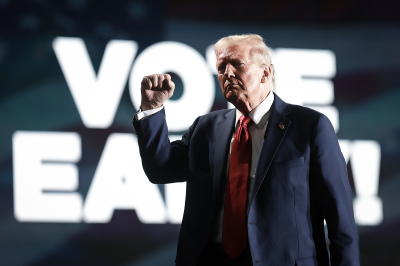Voting for Trump with a clear conscience but a heavy heart

“I would never ask someone to vote against their conscience but rather to reconsider how their conscience is framed.”
Conservatives, if you’re torn on whether to vote for Trump, you’re not alone. It’s OK to be angry at his political squishiness on abortion and IVF. It’s OK to feel betrayed by a once-pro-life policy cornerstone.
It’s OK to wish this lesser evil were less evil.
Still, I hope to assure you that we can vote for Trump with a clear conscience despite a heavy heart.
In 2016, we voted “policy over character,” focusing on abortion and we celebrated Trump’s pro-life victories. But with Trump’s apparent betrayal of pro-life values, is it still worth voting for him?
Yes, for many reasons that I’ll address in this op-ed. I hope this message is found charitably and that I might help conservatives navigate how to clear their conscience of the burden of voting in 2024.
Federal courts
While no U.S. Supreme Court (SCOTUS) vacancy is likely next term, here are some vital points to consider:
- There are over 100 lower federal courts that the president appoints judges to.
- Since 2008, 770 lower federal judges have been installed: 327 by President Obama, 212 by President Biden (so far), and 231 by President Trump. That’s a 539-231 ideological split.
- Harris would likely add over 200 more, making it 740+ to 231.
- SCOTUS only reviews ~100 out of ~7,500 case requests per year, which means thousands of cases are finalized in the lower federal courts. Thus, the president influences thousands of cases that never reach SCOTUS.
- Since these are lifetime seats, the president’s impact on lower federal cases lasts for decades.
- Lower federal judges often become SCOTUS appointees.
- SCOTUS does not often have original jurisdiction over federal law, meaning it can’t be the first to hear the case. Cases must be appealed to SCOTUS from lower courts. Yet it’s not guaranteed that SCOTUS will grant review.
- If a righteous conservative president wins in 2028, their ability to govern righteously will be crippled by four more years of liberal judicial installments, since any righteous policy will inevitably be taken to federal court.
- Trump’s federal judicial appointees have and continue to rule conservatively.
Several major victories that directly impact our livelihoods are the results of Trump’s judicial appointees.
Harris has condemned every one of these judicial victories.
Trans procedures for minors
The Left targets children today because they’re the voters of tomorrow. Allowing trans procedures for minors is unequivocally evil and we must call it so without apology.
Trump is promising to ban trans procedures for minors.
The Biden-Harris admin called such a ban “cruel.”
Abortion
Trump’s refusal to ban abortion while criticizing states that do so, and having Melania Trump make that silly pro-abortion video, is appalling. Still, the pro-life movement is far better off with Trump than Harris.
Why?
Because Trump allows pro-life leaders a seat at his table who have influenced his policy before.
Assuming his pro-choice front is a ploy for moderate votes, here are some pro-life moves he might make:
- Remember, Trump removed Planned Parenthood from Title X, costing them $60 million. Three times he tried taking ALL of their fed funds (~$550 million). Sadly, squishy GOP senators prevented it. U.S. Sen. JD Vance, his running mate, said Trump would try it again.
- Trump could restore states’ rights to defund Planned Parenthood, which he did during his first term.
- Harkening back to lower federal judges, Trump’s appointees would serve a 2028 conservative president much better with any pro-life policy they create. Again, the success of a 2028 conservative president largely depends on the 2024 election and the appointments that follow it.
- Trump’s last administration was full of true pro-life ethicists and fighters. We can assume his new administration will be too.
Trump is not postured to be the pro-life hero we wanted, but his refusal to ban abortions (which would be near impossible anyway with the congressional support needed) does not negate other pro-life measures that he and his administration will likely take.
Harris calls abortion a fundamental freedom — at any time period and for whatever reason.
Protecting women’s sports
Women deserve their hard-earned athletic victories. But with Harris, men will continue robbing women of their achievements. Ironic, since the Left accuses the Right of being misogynistic. The infiltration of men into women’s sports is textbook misogynistic oppression.
Trump is promising to ban men from competing in women’s sports.
Harris applauds the unfairness.
Free speech and religious liberty
Harris condemned a SCOTUS ruling on free speech that protected everyone: Christians, atheists, LGBT, etc. 303 Creative v. Elenis ruled that artists (cake bakers, graphic designers, etc.) cannot be forced to create designs that violate their convictions.
Trump’s SCOTUS appointees protected free speech for all.
Harris decried free speech for all.
Lawfare
Love or hate him, the way that “justice” was severely weaponized against Trump should scare everyone. The new precedent is not that they can go after Trump, but that they can go after anyone — and they will with a biased and politically-charged motive. One ounce of political influence in justice erodes justice entirely.
The gross lawfare levied against Trump gives him a particular incentive to clean some DOJ house.
Trump’s staff
Much of what conservatives appreciated about Trump’s first term was spearheaded by those he appointed. Remember, Trump is one of thousands of politically influential members of the administration. Trump’s first administration saw the likes of righteous conservatives who led initiatives that tangibly championed free speech, religious freedom, pro-life values, and other principles that directly impact a moral citizenry.
A note on third party and refusing to vote
Voting for a nonviable third party, in protest to “voting for the lesser of two evils,” is simply voting for the lesser of three evils and is thus still voting for evil. No virtuous ground is gained. Rather, such a vote neglects its power to prevent the greatest evil. Ironically, such a vote enhances the very evil it set out to avoid. Similarly, a refused vote also forfeits the power to prevent the greatest evil.
It’s not whether you use your power, but how. Voting is an example of acts of commission (active participation, voting) vs. acts of omission (inactive participation, not voting). This is the whole “to not act is to act” scenario. Participation is unavoidable. Acts of omission, with full awareness of the consequences (which we have), hardly recuse one’s culpability in the results, which could mean a victory of an administration whose evil far surpasses Trump’s.
Clarifying Spurgeon’s ‘of two evils, choose neither’
The context of Charles Spurgeon’s “of two evils, choose neither” has been twisted. The great theologian’s 1875 sermon addressed choosing sin. In such a context, if one were to choose neither of the two evils, then neither evil would occur. But this is an election that will occur despite our participation.
Voting doesn’t determine an election’s occurrence. Voting determines an election’s results.
Conclusion
I would never ask someone to vote against their conscience but rather to reconsider how their conscience is framed. This is not a vote for a person but for a purpose to preserve what moral integrity we have left for the generations to come, even if the conduit to such preservation doesn’t reflect our moral standards.
If evil is inevitable, then why not do our part to ensure its restraint?
If evil is inevitable, why not prevent greater affliction on the children of tomorrow?
O that our piety would not come at the expense of the generations to come.
John Wesley Reid is a senior fellow with the Budapest Fellowship Program at the Hungary-based Mathias Corvinus Collegium School of Law. John is a U.S. Marine veteran, former firefighter, and spent six years in Washington D.C. in various media capacities with a focus on abortion, free speech, and the Supreme Court.
Before moving to Budapest, Hungary, John’s tenure in D.C. included the roles of editor-in-chief for Liberty University’s Standing for Freedom Center, digital media director for Family Research Council, and social media news producer for CBN News. He’s an avid gun collector and an alumni of Biola University and Hillsdale College’s James Madison Fellowship.




























